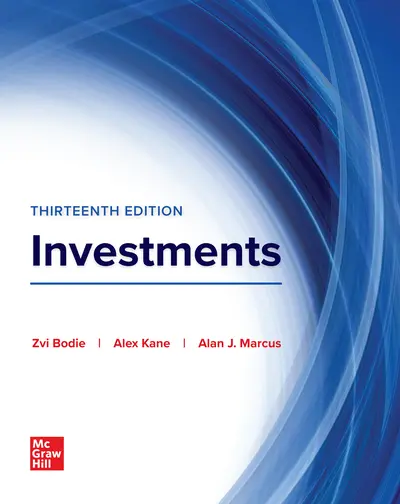My Account Details

ISBN10: 1264412665 | ISBN13: 9781264412662

* The estimated amount of time this product will be on the market is based on a number of factors, including faculty input to instructional design and the prior revision cycle and updates to academic research-which typically results in a revision cycle ranging from every two to four years for this product. Pricing subject to change at any time.
Instructor Information
Quick Actions (Only for Validated Instructor Accounts):
Investments set the standardas a graduate (MBA) text intended primarily for courses in investment analysis.The guiding principle has been to present the material in a framework that isorganized by a central core of consistent fundamental principles and will introducestudents to major issues currently of concern to all investors. In an effort to link theory to practice, the authorsmake their approach consistent with that of the CFA Institute. Many features ofthis text make it consistent with and relevant to the CFA curriculum.
The common unifying theme is that securitymarkets are nearly efficient, meaning that most securities are priced appropriately given their risk and return attributes. Investments is alsoorganized around several important themes: The central theme is the near informational-efficiency of well-developed security markets and the general awareness that competitive markets do not offer "free lunches" to participants. A second theme is the risk–return trade-off. Also, this text places great emphasis on asset allocation. Finally, this text offers a broad and deep treatment of futures, options, and other derivative security markets.
PART I: Introduction
Chapter 1: The Investment Environment
Chapter 2: Asset Classes and Financial Instruments
Chapter 3: How Securities Are Traded
Chapter 4: Mutual Funds and Other InvestmentCompanies
PART II: Portfolio Theory and Practice
Chapter 5: Risk, Return, and the HistoricalRecord
Chapter 6: Capital Allocation to Risky Assets
Chapter 7: Efficient Diversification
Chapter 8: Index Models
PART III: Equilibrium in Capital Markets
Chapter 9: The Capital Asset Pricing Model
Chapter 10: Arbitrage Pricing Theory andMultifactor Models of Risk and Return
Chapter 11: The Efficient Market Hypothesis
Chapter 12: Behavioral Finance and TechnicalAnalysis
Chapter 13: Empirical Evidence on SecurityReturns
PART IV: Fixed-Income Securities
Chapter 14: Bond Prices and Yields
Chapter 15: The Term Structure of Interest Rates
Chapter 16: Managing Bond Portfolios
PART V: Security Analysis
Chapter 17: Macroeconomic and Industry Analysis
Chapter 18: Equity Valuation Models
Chapter 19: Financial Statement Analysis
PART VI: Options, Futures, and Other Derivatives
Chapter 20: Options Markets: Introduction
Chapter 21: Option Valuation
Chapter 22: Futures Markets
Chapter 23: Futures, Swaps, and Risk Management
PART VII: Applied Portfolio Management
Chapter 24: Portfolio Performance Evaluation
Chapter 25: International Diversification
Chapter 26: Alternative Assets
Chapter 27: The Theory of Active PortfolioManagement
Chapter 28: Investment Policy and the Frameworkof the CFA Institute
REFERENCES TO CFA PROBLEMS
GLOSSARY
NAME INDEX
SUBJECT INDEX
NOTATION, FORMULAS
Accessibility
Creating accessible products is a priority for McGraw Hill. We make accessibility and adhering to WCAG AA guidelines a part of our day-to-day development efforts and product roadmaps.
For more information, visit our accessibility page, or contact us at accessibility@mheducation.com
Need support? We're here to help - Get real-world support and resources every step of the way.